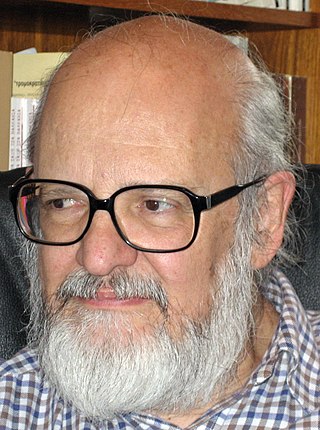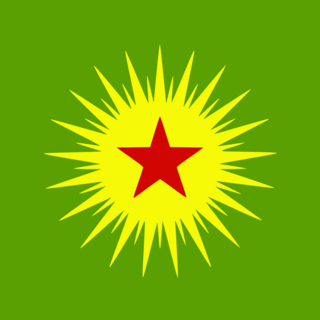
Democracy is a form of government in which the people have the authority to deliberate and decide legislation, or to choose governing officials to do so. Who is considered part of "the people" and how authority is shared among or delegated by the people has changed over time and at different rates in different countries. Features of democracy often include freedom of assembly, association, property rights, freedom of religion and speech, inclusiveness and equality, citizenship, consent of the governed, voting rights, freedom from unwarranted governmental deprivation of the right to life and liberty, and minority rights.
Participatory economics, often abbreviated Parecon, is an economic system based on participatory decision making as the primary economic mechanism for allocation in society. In the system, the say in decision-making is proportional to the impact on a person or group of people. Participatory economics is a form of socialist decentralized planned economy involving the common ownership of the means of production. It is a proposed alternative to contemporary capitalism and centralized planning. This economic model is primarily associated with political theorist Michael Albert and economist Robin Hahnel, who describes participatory economics as an anarchist economic vision.

Direct democracy or pure democracy is a form of democracy in which the electorate decides on policy initiatives without elected representatives as proxies. This differs from the majority of currently established democracies, which are representative democracies. The theory and practice of direct democracy and participation as its common characteristic was the core of work of many theorists, philosophers, politicians, and social critics, among whom the most important are Jean Jacques Rousseau, John Stuart Mill, and G.D.H. Cole.

Michael Albert is an American economist, speaker, writer, and political critic. Since the late 1970s, he has published books, articles, and other contributions on a wide array of subjects. He has also set up his own media outfits, magazines, and podcasts. He is known for helping to develop the socioeconomic theory of participatory economics.
Democratic capitalism, also referred to as market democracy, is a political and economic system. It integrates resource allocation by marginal productivity, with policies of resource allocation by social entitlement. The policies which characterise the system are enacted by democratic governments.
Governance is the process of making and enforcing decisions within an organization or society. It is the process of interactions through the laws, social norms, power or language as structured in communication of an organized society over a social system. It is done by the government of a state, by a market, or by a network. It is the process of choosing the right course among the actors involved in a collective problem that leads to the creation, reinforcement, or reproduction of acceptable conduct and social order". In lay terms, it could be described as the political processes that exist in and between formal institutions.
Anarchist economics is the set of theories and practices of economic activity within the political philosophy of anarchism. Many anarchists are anti-authoritarian anti-capitalists, with anarchism usually referred to as a form of libertarian socialism, i.e. a stateless system of socialism. Anarchists support personal property and oppose capital concentration, interest, monopoly, private ownership of productive property such as the means of production, profit, rent, usury and wage slavery which are viewed as inherent to capitalism.

Jihad vs. McWorld: How Globalism and Tribalism Are Reshaping the World is a 1995 book by American political scientist Benjamin Barber, in which he puts forth a theory that describes the struggle between "McWorld" and "Jihad". Benjamin Barber similarly questions the impact of economic globalization as well as its problems for democracy.

Takis Fotopoulos is a Greek political philosopher, economist and writer who founded the Inclusive Democracy movement, aiming at a synthesis of classical democracy with libertarian socialism and the radical currents in the new social movements. He is an academic, and has written many books and over 900 articles,. He is the editor of The International Journal of Inclusive Democracy and is the author of Towards An Inclusive Democracy (1997) in which the foundations of the Inclusive Democracy project were set. His latest book is The New World Order in Action: Volume 1: Globalization, the Brexit Revolution and the "Left"- Towards a Democratic Community of Sovereign Nations. Fotopoulos is Greek and lives in London.

Democracy & Nature was a peer-reviewed academic journal of Politics established in 1992 by Takis Fotopoulos as Society and Nature, obtaining its later name in 1995. Four volumes of three issues each were released by Aigis Publications from 1992 to 1999. From 1999 to 2003, five more volumes were released by Routledge. Publication ceased at the end of 2003, after which Fotopoulos established a new journal, The International Journal of Inclusive Democracy.

Steven Best is an American philosopher, writer, speaker and activist. His concerns include animal rights, species extinction, human overpopulation, ecological crisis, biotechnology, liberation politics, terrorism, mass media and culture, globalization, and capitalist domination. He is Associate Professor of Humanities and Philosophy at the University of Texas at El Paso. He has published 13 books and over 200 articles and reviews.
Labour vouchers are a device proposed to govern demand for goods in some models of socialism and to replace some of the tasks performed by currency under capitalism.

The Ecologist Green Party, formerly known as the Ecologist Party of Moldova "Green Alliance" is a green political party in Moldova.
Solidarity economy or Social and Solidarity Economy (SSE) refers to a wide range of economic activities that aim to prioritize social profitability instead of purely financial profits. A key feature that distinguishes solidarity economy entities from private and public enterprises is the participatory and democratic nature of governance in decision-making processes as one of the main principles of the SSE sector. Active participation of all people involved in decision-making procedures contributes to their empowerment as active political subjects. However, different SSE organizational structures reflect variations in democratic governance and inclusive participation. Ultimately, SSE represents a crucial tool in guaranteeing that social justice ideals are upheld and that the wellbeing of the most vulnerable populations is paid attention to during the planning processes.
Environmental politics designate both the politics about the environment and an academic field of study focused on three core components:
Types of democracy refers to pluralism of governing structures such as governments and other constructs like workplaces, families, community associations, and so forth. Types of democracy can cluster around values. For example, some like direct democracy, electronic democracy, participatory democracy, real democracy, and deliberative democracy, strive to allow people to participate equally and directly in protest, discussion, decision-making, or other acts of politics. Different types of democracy - like representative democracy - strive for indirect participation as this procedural approach to collective self-governance is still widely considered the only means for the more or less stable democratic functioning of mass societies. Types of democracy can be found across time, space, and language. In the English language the noun "democracy" has been modified by 2,234 adjectives. These adjectival pairings, like atomic democracy or Zulu democracy, act as signal words that point not only to specific meanings of democracy but to groups, or families, of meaning as well.
A facilitation board is a proposed economic institution conceived by economists Michael Albert and Robin Hahnel which act in systems of economic democracy as agencies that facilitate information exchange and processing for collective consumption proposals and for large-scale investment projects, workers requests for changing places of employment, and individuals and families seeking to find membership in living units and neighborhoods, among other functions.
Economic democracy is a socioeconomic philosophy that proposes to shift decision-making power from corporate managers and corporate shareholders to a larger group of public stakeholders that includes workers, customers, suppliers, neighbours and the broader public. No single definition or approach encompasses economic democracy, but most proponents claim that modern property relations externalize costs, subordinate the general well-being to private profit and deny the polity a democratic voice in economic policy decisions. In addition to these moral concerns, economic democracy makes practical claims, such as that it can compensate for capitalism's inherent effective demand gap.
Eco-socialism is an ideology merging aspects of socialism with that of green politics, ecology and alter-globalization or anti-globalization. Eco-socialists generally believe that the expansion of the capitalist system is the cause of social exclusion, poverty, war and environmental degradation through globalization and imperialism, under the supervision of repressive states and transnational structures.

Democratic confederalism, also known as Kurdish communalism or Apoism, is a political concept theorized by Kurdistan Workers Party (PKK) leader Abdullah Öcalan about a system of democratic self-organization with the features of a confederation based on the principles of autonomy, direct democracy, political ecology, feminism, multiculturalism, self-defense, self-governance and elements of a cooperative economy. Influenced by social ecology, libertarian municipalism, Middle Eastern history and general state theory, Öcalan presents the concept as a political solution to Kurdish national aspirations, as well as other fundamental problems in countries in the region deeply rooted in class society, and as a route to freedom and democratization for people around the world.










